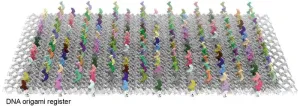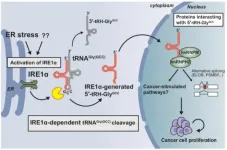(Press-News.org) SAN ANTONIO – Imlunestrant, an investigational next-generation selective estrogen receptor degrader (SERD), improved progression-free survival in patients with endocrine therapy-pretreated, ER-positive, HER2-negative advanced breast cancer—as monotherapy in patients with ESR1 mutations and as combination therapy with abemaciclib (Verzenio) in all patients, regardless of ESR1 mutation status—according to results from the phase III EMBER-3 clinical trial presented at the San Antonio Breast Cancer Symposium (SABCS), held December 10-13, 2024.
The results of this study were simultaneously published in the New England Journal of Medicine.
“The main purpose of this EMBER-3 trial was to evaluate the role of imlunestrant, a brain-penetrant oral SERD, as monotherapy or in combination with the CDK4/6 inhibitor, abemaciclib, in patients with ER-positive, HER2-negative advanced breast cancer whose disease had recurred or progressed during or after an aromatase inhibitor alone or with a CDK4/6 inhibitor,” said Komal Jhaveri, MD, the Patricia and James Cayne Chair for Junior Faculty, section head of the Endocrine Therapy Research Program, and clinical director of the Early Drug Development Service at Memorial Sloan Kettering Cancer Center, and presenter of the study.
“CDK4/6 inhibitors have been a critical addition to standard endocrine therapy with aromatase inhibitors, and if progression occurs, combining a SERD with a CDK4/6 inhibitor can be beneficial. However, given the limitations of existing SERDs like fulvestrant, including lack of oral bioavailability and need for monthly intramuscular injection, along with limited efficacy in patients who develop ESR1-mutations, novel SERDs such as imlunestrant are being developed with the goal of improving both efficacy and patient experience through ease of administration,” said Jhaveri, noting that ESR1 mutations are seen in 40%-50% of patients progressing on endocrine therapy.
Unlike fulvestrant, imlunestrant can be taken orally and can penetrate the blood-brain barrier, offering the possibility of targeting central nervous system metastases, explained Jhaveri, who is also an associate professor at Weill Cornell Medical College.
In the multicenter study, 874 patients with ER-positive, HER2-negative advanced breast cancer were randomly assigned (1:1:1) to receive either imlunestrant alone, standard endocrine therapy (fulvestrant or exemestane) alone, or imlunestrant plus abemaciclib.
Compared to standard endocrine therapy, imlunestrant significantly improved progression-free survival in patients with ESR1 mutations but not in the overall population. In the patients harboring ESR1 mutations, imlunestrant reduced the risk of progression or death by 38%.
“These promising results mean that imlunestrant is potentially another single-agent option for the many patients whose recurrent breast cancers harbor ESR1 mutations,” said Jhaveri.
Furthermore, compared to imlunestrant alone, imlunestrant and abemaciclib together were associated with a 43% reduction in risk of progression or death, resulting in median progression-free survival of 9.4 months and 5.5 months respectively, for the combination and monotherapy groups. The benefit of combining these two therapies, both of which can be taken orally, were observed in all patients, including those with and without ESR1 mutations or PI3K-pathway mutations and including those previously treated with a CDK4/6 inhibitor.
“The consistency of these results across clinically relevant subgroups is reassuring given most patients eligible for second-line therapy have received a CDK4/6 inhibitor previously and many currently available second-line therapies require biomarker selection,” noted Jhaveri, who called the data practice changing.
Imlunestrant was well tolerated, both as monotherapy and in combination, Jhaveri said. Imlunestrant showed favorable safety profile, with generally low-grade and manageable adverse events, and without the oral SERD-specific safety signals of ocular or cardiac issues. The safety profile of the combination was consistent with the known fulvestrant-abemaciclib profile with a relatively low discontinuation rate of 6.3% that compares favorably to available combination regimens. Additionally in patient-reported outcomes data from the study, 72% of patients receiving fulvestrant reported injection site pain, swelling, or redness.
“Taken together, these data are encouraging for patients and show that imlunestrant, as monotherapy or combined with abemaciclib, could provide an all-oral targeted therapy option after progression on endocrine therapy for patients with ER-positive, HER2-negative advanced breast cancer.”
One limitation of the study is that unlike the phase III postMONARCH and EMERALD trials, EMBER-3 did not require prior treatment with a CDK4/6 inhibitor. However, most patients (65%) in the combination therapy comparison in EMBER-3 were CDK4/6 inhibitor pretreated and the treatment effect of imlunestrant-abemaciclib in these patients was consistent with the overall population.
This study was supported by Eli Lilly and Company. Jhaveri has consulting or advisory roles with Novartis, Pfizer, Taiho Oncology, Genentech, AbbVie, Eisai, AstraZeneca, Blueprint Medicines, Daiichi Sankyo, Sun Pharma Advanced Research Company Ltd., Menarini/Stemline Therapeutics, Gilead, Scorpion Therapeutics, Olema Pharmaceuticals, Bicycle Therapeutics, Lilly/Loxo Oncology, and Zymeworks. Jhaveri also has research funding support to her institution from Novartis, Genentech, AstraZeneca, Pfizer, Lilly/Loxo Oncology, Zymeworks, Immunomedics/Gilead, Puma Biotechnology, Merck Pharmaceuticals, Context Therapeutics, Scorpion Therapeutics, Eisai, RayzeBio, and Blueprint Medicines.
END
Next-generation SERD protects against progression in some patients with advanced breast cancer resistant to standard hormone therapy
Imlunestrant was effective in combination with abemaciclib, and as monotherapy in ESR1-mutated breast cancer
2024-12-11
ELSE PRESS RELEASES FROM THIS DATE:
Carnegie Mellon University Africa and Challenger Center collaborate to deliver STEM programs
2024-12-11
Carnegie Mellon University Africa and Challenger Center Collaborate to Deliver STEM Programs
Partnership Will Promote STEM Education and Careers to Secondary School Students in Africa
Carnegie Mellon University Africa, CMU’s College of Engineering location in Kigali, Rwanda, and Challenger Center, will partner to deliver Challenger Center’s Virtual Missions to hundreds of secondary school students on the continent. This project will help grow the population of African students who are motivated to pursue higher education and careers in science, technology, engineering, and math (STEM) fields.
Challenger Center’s Virtual Missions are space-themed experiences for students ...
Top five rising star Texas researchers named in 2025 Edith and Peter O’Donnell Awards by TAMEST
2024-12-11
Identifying novel therapeutic strategies and making fundamental discoveries related to small cell lung cancer. Creating environmental and sustainable solutions for lithium-ion battery technology. Improving the safety and efficacy of gene editing and understanding the mechanisms of DNA repair to potentially cure diseases. Discovering the most distant and massive galaxies that have reshaped our understanding of early Universe star formation and supermassive black holes. Pioneering geochemical fingerprinting technology to optimize energy production processes.
These are the breakthroughs ...
Fast, rewritable computing with DNA origami registers
2024-12-11
DNA stores the instructions for life and, along with enzymes and other molecules, computes everything from hair color to risk of developing diseases. Harnessing that prowess and immense storage capacity could lead to DNA-based computers that are faster and smaller than today’s silicon-based versions. As a step toward that goal, researchers report in ACS Central Science a fast, sequential DNA computing method that is also rewritable — just like current computers.
“DNA computing as a liquid computing paradigm has unique application ...
Uncovering the pigments and techniques used to paint the Berlin Wall
2024-12-11
Street art takes many forms, and the vibrant murals on the Berlin Wall both before and after its fall are expressions of people’s opinions. But there was often secrecy around the processes for creating the paintings, which makes them hard to preserve. Now, researchers reporting in the Journal of the American Chemical Society have uncovered information about this historic site from paint chips by combining a handheld detector and artificial intelligence (AI) data analysis.
“The research highlights the powerful impact of the synergy between chemistry and deep learning in quantifying matter, exemplified in this case by pigments that make street ...
MD Anderson’s Lauren Averett Byers receives TAMEST O’Donnell Award for seminal contributions to lung cancer research
2024-12-11
HOUSTON ― Lauren Averett Byers, M.D., professor of Thoracic/Head & Neck Medical Oncology at The University of Texas MD Anderson Cancer Center, has received the
2025 Edith and Peter O’Donnell Award in Medicine from the Texas Academy of Medicine, Engineering, Science and Technology (TAMEST). The award recognizes her fundamental discoveries and contributions to identifying novel therapeutic strategies for small cell lung cancer (SCLC), which have paved the way for personalized treatments, even in the ...
Chung-Ang University researchers unveil the biogenesis and role of transfer RNA fragments in cancer progression
2024-12-11
To fill this knowledge gap, a group of researchers led by Professor Kangseok Lee, from the Department of Life Science, Chung-Ang University set out to explore the biogenesis and function of specific tRFs like tRHs. Their study published in Volume 15 of Nature Communications on 28 October 2024, opens exciting avenues for the future of cancer therapies and introduces potential biomarkers for improved clinical outcomes.
This study was inspired by a serendipitous discovery in 2010, when the researchers found high levels of small RNA fragments derived from specific tRNAs, rather than the anticipated ...
Secret of the female orgasm uncovered by psychologists
2024-12-11
The secret of the female orgasm may have been revealed by scientists in a pioneering study.
Researchers led by the University of Essex found that women climax more frequently if they have high levels of an inward-looking sense known as interoception.
Dr Megan Klabunde, from the Department of Psychology, discovered women who noticed and attend to internal bodily signals– like heartbeats, breathing, and sensual touch sensations - have more frequent orgasms.
Dr Klabunde says this is one of the first times healthy female orgasms have been studied and they are important for women’s well-being and boost relationship satisfaction.
Improving lives
It is hoped the ...
Breakthrough in zinc-based rechargeable batteries: A safer, sustainable alternative
2024-12-11
CLEVELAND—Rechargeable lithium-ion batteries power everything from electric vehicles to wearable devices. But new research from Case Western Reserve University suggests that a more sustainable and cost-effective alternative may lie in zinc-based batteries.
In a study published recently in Angewandte Chemie, researchers announced a significant step toward creating high-performance, low-cost zinc-sulfur batteries.
“This research marks a major step forward in the development of safer and more ...
"Superman" bacteria offer a sustainable boost to chemical production
2024-12-11
Trillions of bacteria work in the chemical and pharmaceutical industries, helping produce everything from beer and facial creams to biodiesel and fertilizer. The pharmaceutical industry, in particular, relies heavily on bacteria for producing substances like insulin and penicillin.
Harnessing bacteria's industrial contributions have revolutionized global health, but their work comes at a high energy cost. Additionally, solvents and continuous production of new bacteria are often necessary, as they don't last long in their jobs.
Changzhu ...
FunMap reveals a functional network of genes and proteins in human cancer
2024-12-11
Large-scale protein and gene profiling have massively expanded the landscape of cancer-associated proteins and gene mutations, but it has been difficult to discern whether they play an active role in the disease or are innocent bystanders. In a study published in Nature Cancer, researchers at Baylor College of Medicine revealed a powerful and unbiased machine learning-based approach called FunMap for assessing the role of cancer-associated mutations and understudied proteins, with broad implications for advancing cancer biology and informing therapeutic strategies.
“Gaining functional information on the genes and proteins associated with cancer is an important ...
LAST 30 PRESS RELEASES:
Nonprofit leader Diane Dodge to receive 2026 Penn Nursing Renfield Foundation Award for Global Women’s Health
Maternal smoking during pregnancy may be linked to higher blood pressure in children, NIH study finds
New Lund model aims to shorten the path to life-saving cell and gene therapies
Researchers create ultra-stretchable, liquid-repellent materials via laser ablation
Combining AI with OCT shows potential for detecting lipid-rich plaques in coronary arteries
SeaCast revolutionizes Mediterranean Sea forecasting with AI-powered speed and accuracy
JMIR Publications’ JMIR Bioinformatics and Biotechnology invites submissions on Bridging Data, AI, and Innovation to Transform Health
Honey bees navigate more precisely than previously thought
Air pollution may directly contribute to Alzheimer’s disease
Study finds early imaging after pediatric UTIs may do more harm than good
UC San Diego Health joins national research for maternal-fetal care
New biomarker predicts chemotherapy response in triple-negative breast cancer
Treatment algorithms featured in Brain Trauma Foundation’s update of guidelines for care of patients with penetrating traumatic brain injury
Over 40% of musicians experience tinnitus; hearing loss and hyperacusis also significantly elevated
Artificial intelligence predicts colorectal cancer risk in ulcerative colitis patients
Mayo Clinic installs first magnetic nanoparticle hyperthermia system for cancer research in the US
Calibr-Skaggs and Kainomyx launch collaboration to pioneer novel malaria treatments
JAX-NYSCF Collaborative and GSK announce collaboration to advance translational models for neurodegenerative disease research
Classifying pediatric brain tumors by liquid biopsy using artificial intelligence
Insilico Medicine initiates AI driven collaboration with leading global cancer center to identify novel targets for gastroesophageal cancers
Immunotherapy plus chemotherapy before surgery shows promise for pancreatic cancer
A “smart fluid” you can reconfigure with temperature
New research suggests myopia is driven by how we use our eyes indoors
Scientists develop first-of-its-kind antibody to block Epstein Barr virus
With the right prompts, AI chatbots analyze big data accurately
Leisure-time physical activity and cancer mortality among cancer survivors
Chronic kidney disease severity and risk of cognitive impairment
Research highlights from the first Multidisciplinary Radiopharmaceutical Therapy Symposium
New guidelines from NCCN detail fundamental differences in cancer in children compared to adults
Four NYU faculty win Sloan Foundation research fellowships
[Press-News.org] Next-generation SERD protects against progression in some patients with advanced breast cancer resistant to standard hormone therapyImlunestrant was effective in combination with abemaciclib, and as monotherapy in ESR1-mutated breast cancer





